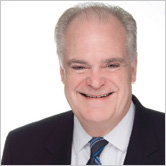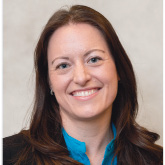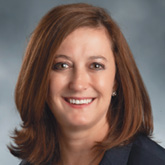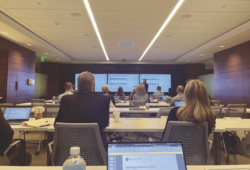Just as thousands of medical and pharmacy school students were celebrating Match Day in March 2020 (many of them virtually), their future hospitals of residence were preparing for a flood of patients due to a looming global pandemic. Their beginnings as newly graduated physicians and pharmacists would be like none before them.
Graduate medical education (GME) leaders were well aware that the pandemic would affect their residency programs. They began thinking through how to provide high-quality training while prioritizing a safe clinical environment.
A once-in-a-lifetime opportunity

One could categorize starting your medical career in the midst of a global pandemic as trial by fire. But Bruce Deighton, Ph.D., Vice President of Healthcare Graduate Medical Education at HCA Healthcare, views it as a once-in-a-lifetime experience for residents. He oversees 275 residency and fellowship programs at 58 teaching hospitals across the country. These training opportunities span 26 specialties and subspecialties, with more than 4,500 residents and fellows.
“In many ways, our clinical training is enhanced because our residents and fellows have had to pivot and adapt to changing needs,” says Deighton. “That kind of agility is an important skill for physicians to learn early on in their careers.”
Deighton shares that while residents and fellows have continued to provide clinical care in hospitals throughout 2020, many have also become experts at delivering care via telehealth—largely due to COVID-19 restrictions. “Because of the conservation efforts around PPE [personal protective equipment], fewer residents could enter patient rooms, especially if a patient was thought to be COVID-positive,” he explains.
News ways of learning

BCACP
Jennifer Sternbach, PharmD, BCPS, BCACP, is Corporate Director of Clinical Pharmacy Services at RWJBarnabas Health, which has eight PGY-1 and five PGY-2 pharmacy residency programs throughout the New Jersey health system. In addition, RWJBarnabas Health has physician residency programs in collaboration with Rutgers University.
Sternbach says clinical training has not been affected in her programs; their residents have been part of caring for their patients with COVID-19 and have learned to adapt, along with everyone else. Some adjustments had to be made in some elective rotations, but they’ve largely given residents a traditional training experience.
“The residents received increased practice in the management of critical care patients,” she says. “Many expressed a strong degree of comfort in this care area at the end of their residency.”

Heidi Pillen, PharmD, FASHP, Senior Director of System Pharmacy at Beaumont Health, the largest health system in Michigan, explains how COVID-19 caused them to pivot. “Southeast Michigan was a hot spot starting in early March, so we were hit hard and early,” she says. Pharmacy residents were needed to help take care of patients.
While the clinical training structure remained unchanged, Beaumont, which has three sites offering pharmacy residency training, successfully shifted to provide live, continuous education programming and recordings for home study. In addition, the Leadership Development program was conducted through a virtual platform. These changes were still in effect as Michigan entered a second surge.
Sternbach and her team also adapted their presentations to be delivered virtually. “System meetings that would normally have been in-person are held in smaller groups or remotely. Unique residency experiences such as the Residency Leadership Forum have been held either in smaller groups or in large rooms to allow for social distancing,” she says.
A virtual hiring process
Nearly all of HCA Healthcare’s GME events have transitioned to an online format, including graduations, resident recruitment interviews and onboarding activities for new residents. Deighton expects this will continue even when the pandemic ends.
“In the past, medical students paid out of their own pockets to travel the country for in-person residency interviews,” says Deighton. “Shifting to virtual interviewing makes the process more convenient and less expensive for applicants.”
While COVID-19 has certainly thrown a major curveball at physician and pharmacy residency programs for the 2020–2021 academic year, some things haven’t changed. Focusing on the basics of training and staying connected to residents and fellows remains as important as ever.
“Program directors across the system are extremely committed to residency development, and we have been able to navigate a new road together,” says Sternbach.
Deighton agrees: “Our ultimate goal is helping every resident and fellow become a highly competent, independent physician committed to caring for patients with compassion, purpose and integrity,” he adds.
Share Email COVID-19, Employee Training, Q1 2021, Virtual environment




